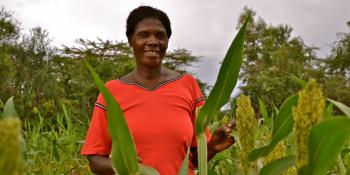Uganda has a total land area of 241 548 km2. More than two-thirds of the country is a plateau with more than 75% (over 18 million hectares) available for both cultivation and pasture. The country has a population of 37.78 million and an annual gross domestic product (GDP) of approximately USD 26.31 billion (World Bank, 2014).
Agriculture contributes up to 40% of Uganda’s total GDP and over 90% of the country’s foreign exchange earnings. Up to 95% of the population is engaged in rainfed mixed farming for food and cash income. Key challenges for the agricultural sector include low production and productivity due to poor farming practices, weather variability and pests and diseases. Other challenges include low value addition to agricultural produce and limited market access, weak implementation of agricultural laws and policies, and weak public agricultural institutions.
In order to build resilience in agricultural systems in Uganda, the CGIAR Research Program on Climate Change, Agriculture and Food Security (CCAFS) promotes innovations by tapping into the expertise of other CGIAR Centers, as well as other national and regional research networks. Efforts are focused around the promotion of climate-smart agriculture that faciliates adaptation in cereal-based and livestock systems. In addition, the program works with the Ministry of Water and Environment (MWE) and the Ministry of Agriculture, Animal Industry and Fisheries (MAAIF) to mainstream climate change into national agriculture plans and agriculture into climate change policy.
Key initiatives in Uganda:
Climate-smart villages (CSVs): These are models of local actions that ensure food security, promote adaptation and build resilience to climatic stresses. In the CSVs, researchers, local partners, farmers’ groups and policymakers test portfolios of climate-smart agriculture (CSA) technologies and practices with the aim of scaling up successful innovations. In Uganda, CCAFS has established two learning sites—located in Hoima and Rakai districts—with an aim of transforming these into CSVs in the near future. Ongoing participatory action research includes evaluation of drought tolerant and disease resistant bean varieties.
National adaptation planning: In Uganda, CCAFS has been engaging with the Climate Change Unit, Ministry of Water and Environment (CCU-MWE) to action priority measures which were identified in the National Adaptation Programmes of Action (NAPAs). Read more addressing priority adaptation measures in Uganda.
